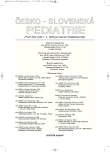-
Medical journals
- Career
Invasive Mycotic Infection at the Clinic of Children Oncology, Faculty Hospital Brno, 2002–2006
Authors: K. Toušovská 1; D. Dembická 1; P. Lokaj 1; P. Múdrý 1; I. Kocmanová 2; J. Skotáková 3; P. Habanec 4; J. Štěrba 1
Authors‘ workplace: Klinika dětské onkologie LF MU Brno a FN Brno přednosta prof. MUDr. J. Štěrba, PhD. 1; Oddělení klinické mikrobiologie FN Brno primářka MUDr. A. Ševčíková 2; Klinika dětské radiologie LF MU Brno a FN Brno přednostka doc. MUDr. J. Skotáková, CSc. 3; Ústav patologie LF MU Brno a FN Brno přednosta prof. MUDr. J. Mačák, CSc. 4
Published in: Čes-slov Pediat 2007; 62 (12): 664-673.
Category: Original Papers
Overview
Introduction:
Invasive mycotic infections (IFI) are redoubtable complications in the therapy of patients with oncology diagnosis. Their lethality reaches up to 80% and the economic aspects of the therapy are also not negligible. Incidence of IFI within the framework of individual workplaces may differ in relation to the structure of the patients’ cohort, antibiotic and antimycotic therapeutic policy and epidemiological conditions of the workplace. The objective of this investigation was to determine incidence of IFI at the authors’ workplace weight years since the foundation.Methods:
The authors retrospectively evaluated clinical, microbiological and radiological data of the patients with consumption of systemic antimycotics and applied consensual diagnostic criteria of IFI for all of them.Results:
In the given period of time 562 patients have been treated at the clinic, 14 of them (2.5%) having established the diagnosis of IFI. In 10 of the patients IFI diagnosis was certain, probable in one patient and possible in three others. In nice cases there was an invasive candidosis (IC), in four cases invasive aspergillosis (IA) and one patient suffered from invasive zygomycosis. The proved agents in six cases of IC were strains of C. non albicans, and C. albicans in three patients. The basic diagnosis of acute myeloid leukemia or myelodysplastic syndrome (AML/MDS) and medulloblastoma (MBL) was associated with 11.9 and 5.4-fold increased risk of IFI, respectively. Prophylactic administration of ancimycotics in the colonized patients failed in the prevention of IFI. Two patients died due to IFI (14.2%). There have not been any difference in mortality between neutropenic and non - neutropenic patients.Conclusion:
The incidence of IFI has not differed from the published data. The tendency for increasing IFI incidence over the last two years and a high proportion of C. non albicans strains among agents of invasive candidoses represents a serious finding. For the patients with AML/MDS who are at the highest risk, primary anti - mycotic prophylaxis may be useful. It should be at best performed in conditions of muticentric controlled study.Key words:
invasive mycotic infection, malignity, incidence, therapy, mortality
Labels
Neonatology Paediatrics General practitioner for children and adolescents
Article was published inCzech-Slovak Pediatrics

2007 Issue 12-
All articles in this issue
- Surgical Treatment of Renal Fusion Anomalies
- Injury Incidence in School Aged Children. The Risk of Fractures and Luxa - tions in Relation to Gender and Child Development
- Invasive Mycotic Infection at the Clinic of Children Oncology, Faculty Hospital Brno, 2002–2006
- Environmental Risk Factors for the Development of Atopy in Children
- Pierre-Robin Complex Associated with Multiple Congenital Malformations – a case report
- Czech-Slovak Pediatrics
- Journal archive
- Current issue
- Online only
- About the journal
Most read in this issue- Pierre-Robin Complex Associated with Multiple Congenital Malformations – a case report
- Surgical Treatment of Renal Fusion Anomalies
- Environmental Risk Factors for the Development of Atopy in Children
- Invasive Mycotic Infection at the Clinic of Children Oncology, Faculty Hospital Brno, 2002–2006
Login#ADS_BOTTOM_SCRIPTS#Forgotten passwordEnter the email address that you registered with. We will send you instructions on how to set a new password.
- Career

